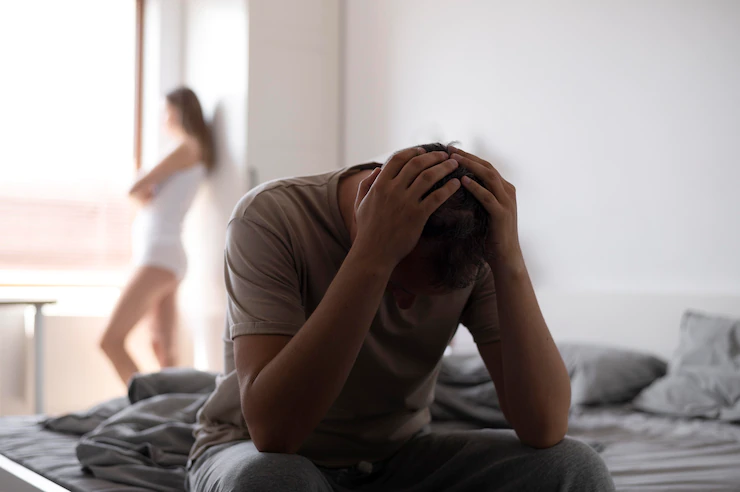Sexual Problems
Sexual Dysfunction
Sexual dysfunction can be any problem that prevents a person or couple from experiencing satisfaction from sexual activity. Some 43% of women and 31% of men report some degree of sexual dysfunction.
What is sexual dysfunction?
Sexual dysfunction is a problem that can happen during any phase of the sexual response cycle. It prevents you from experiencing satisfaction from sexual activity.
The sexual response cycle traditionally includes excitement, plateau, orgasm, and resolution. Desire and arousal are both part of the excitement phase of the sexual response. It’s important to know women don’t always go through these phases in order.
While research suggests that sexual dysfunction is common, many people don’t like talking about it. Because treatment options are available, though, you should share your concerns with your partner and healthcare provider
What are the types of sexual dysfunction?
Sexual dysfunction generally is classified into four categories:
- Desire disorders: lack of sexual desire or interest in sex.
- Arousal disorders: inability to become physically aroused or excited during sexual activity.
- Orgasm disorders: delay or absence of orgasm (climax).
- Pain disorders: pain during intercourse
Who is affected by sexual dysfunction?
Sexual dysfunction can affect any age, although it is more common in those over 40 because it’s often related to a decline in health associated with aging.

What are the symptoms of sexual dysfunction?
In people assigned male at birth:
- Inability to achieve or maintain an erection (hard penis) suitable for intercourse (erectile dysfunction).
- Absent or delayed ejaculation despite enough sexual stimulation (retarded ejaculation).
- Inability to control the timing of ejaculation (early, or premature, ejaculation).
In people assigned female at birth:
- Inability to achieve orgasm.
- Inadequate vaginal lubrication before and during intercourse.
- Inability to relax the vaginal muscles enough to allow intercourse.
In everyone:
- Lack of interest in or desire for sex.
- Inability to become aroused.
- Pain with intercourse.
What causes sexual dysfunction?
Psychological causes: These include work-related stress and anxiety, concern about sexual performance, marital or relationship problems, depression, feelings of guilt, concerns about body image, and the effects of a past sexual trauma
Physical causes: Many physical and/or medical conditions can cause problems with sexual function. These conditions include diabetes, heart and vascular (blood vessel) disease, neurological disorders, hormonal imbalances, chronic diseases such as kidney or liver failure, alcohol use disorder, and substance use disorder. In addition, the side effects of some medications, including some antidepressant drugs, can affect sexual function.
What medications can cause sexual dysfunction?
Some prescription medications and even over-the-counter drugs can have an impact on sexual functioning. Some medicines can affect libido (desire) and others can affect the ability to become aroused or achieve orgasm. The risk of sexual side effects is increased when an individual is taking several medications.
Sexual side effects have been reported with the following medications:
Non-prescription medicines
Some over-the-counter antihistamines and decongestants can cause erectile dysfunction or problems with ejaculation.

Anti-hypertensive medications (used to treat high blood pressure)
Antidepressants
- Tricyclic antidepressants, including amitriptyline (Elavil), doxepin (Sinequan), imipramine (Tofranil), and nortriptyline (Aventyl, Pamelor)
- Monoamine oxidase inhibitors (MAOIs), including phenelzine (Nardil) and tranylcypromine (Parnate)
- Antipsychotic medications, including thioridazine (Mellaril), thiothixene (Navane), and haloperidol (Haldol)
- Anti-mania medications such as lithium carbonate (Eskalith, Lithobid)
- Selective serotonin reuptake inhibitors (SSRIs) such as fluoxetine (Prozac), sertraline (Zoloft), and paroxetine (Paxil).
The following medications may cause erectile dysfunction:
- Diuretics, including spironolactone (Aldactone) and thiazides (Diuril, Naturetin, and others)
- Centrally acting agents, including methyldopa (Aldomet) and reserpine (Serpasil, Raudixin)
- a-Adrenergic blockers, including prazosin (Minipress) and terazosin (Hytrin)
- b-adrenergic (beta) blockers, including propranolol (Inderal) and metoprolol (Lopressor)
The following medications may decrease sexual desire:
Hormones
- Leuprolide (Lupron)
- Goserelin (Zoladex)
DIAGNOSIS AND TESTS
How is sexual dysfunction diagnosed?
In most cases, you recognize something interfering with your enjoyment (or a partner’s enjoyment) of a sexual relationship. Your provider usually begins with a complete history of symptoms and a physical. They may order diagnostic tests to rule out medical problems that may be contributing to the dysfunction. Typically lab testing plays a very limited role in the diagnosis of sexual dysfunction.
An evaluation of attitudes about sex, as well as other possible contributing factors —fear, anxiety, past sexual trauma/abuse, relationship concerns, medications, alcohol or drug abuse, etc. —, helps a clinician understand the underlying cause of the problem and recommend the right treatment.
How is sexual dysfunction treated?
Most types of sexual dysfunction can be addressed by treating the underlying physical or psychological problems. Other treatment strategies include:
Medication: When a medication is the cause of the dysfunction, a change in the medication may help. Men and women with hormone deficiencies may benefit from hormone shots, pills, or creams. For men, drugs, including sildenafil (Viagra®), tadalafil (Cialis®), vardenafil (Levitra®, Staxyn®), and avanafil (Stendra®) may help improve sexual function by increasing blood flow to the penis. For women, hormonal options such as estrogen and testosterone can be used (although these medications are not approved for this purpose). In premenopausal women, there are two medications that are approved by the FDA to treat low desire, including flibanserin (Addyi®) and bremelanotide (Vyleesi®).
Mechanical aids: Aids such as vacuum devices and penile implants may help men with erectile dysfunction (the inability to achieve or maintain an erection). A vacuum device (EROS-CTD™) is also approved for use in women but can be expensive. Dilators may help women who experience narrowing of the vagina. Devices like vibrators can be helpful to help improve sexual enjoyment and climax.
Sex therapy: Sex therapists can people experiencing sexual problems that can’t be addressed by their primary clinician. Therapists are often good marital counselors, as well. For the couple who wants to begin enjoying their sexual relationship, it’s well worth the time and effort to work with a trained professional.
Behavioral treatments: These involve various techniques, including insights into harmful behaviors in the relationship, or techniques such as self-stimulation for treatment of problems with arousal and/or orgasm.
Psychotherapy: Therapy with a trained counselor can help you address sexual trauma from the past, feelings of anxiety, fear, guilt, and poor body image. All of these factors may affect sexual function.
Education and communication: Education about sex and sexual behaviors and responses may help you overcome anxieties about sexual function. Open dialogue with your partner about your needs and concerns also helps overcome many barriers to a healthy sex life.

If you’re looking for a way to stay up-to-date on all the latest news and information from Sex Problem Solution, then be sure to follow us on Social media platforms. We regularly post updates about new products, events, and anything else that might be of interest to our customers. Plus, it’s a great way to see what our team is up to behind the scenes!

